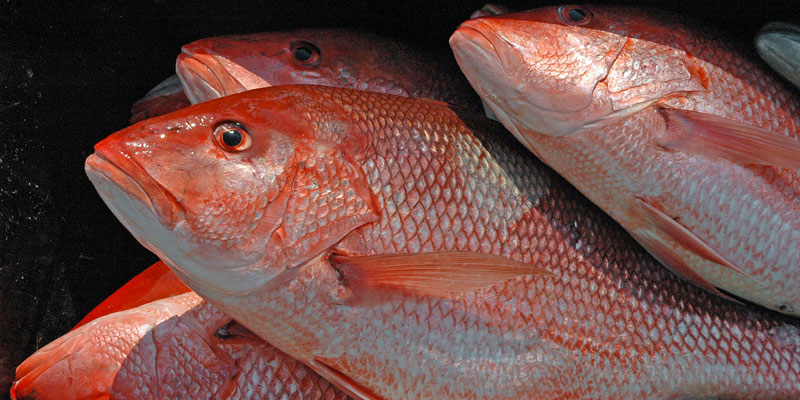Alabama’s recreational fishermen will be allowed to catch red snapper on weekends throughout the summer thanks to an experimental permit granted to the state from the federal government’s NOAA Fisheries.
Private anglers – fishermen who own boats and aren’t licensed by the state or federal government as charter boats – will be allowed to fish on Friday, Saturday and Sunday from June 1 through Sept. 3. The season will also include the entire week of July 4 and Monday, Sept. 3, Labor Day. Anglers are permitted two fish per day and the fish must be at least 16 inches in total length.
To fish for red snapper, anglers ages 16-64 must have a valid Alabama saltwater fishing license. Fishermen 65 and older and those younger than 16 are exempt from license requirements. They must sign up with the free Saltwater Angler’s Registry. It is available in the license section.
The season for federally licensed charter boats runs straight through from June 1 through July 21.
Alabama Director of Marine Resources Scott Bannon explained that NOAA issues exempted permits to allow experimental programs outside the normal rules for the fishery.
“We have to put rules in place, but they are different rules,” Bannon said.
Red snapper season has been among the most contentious issues between the sport fishing community and the federal government. Anglers accused the Obama administration of pandering to environmentalists and commercial fishing interests to place unnecessarily restrictive regulations and short seasons on recreational anglers. The issue came to a head last year when the federal government announced a three-day federal season.
Among the reasons for granting the exemption to Alabama is its extensive artificial reef system. While Alabama’s coastline is tiny, thousands of man-made objects, ranging from old ships to concrete bridge rubble, were sunk off its shores to create fish habitat. A disproportionately large part of the red snapper catch comes from off Alabama’s shores because of the large snapper population living around those reefs.
“We’re the only state that has a designated reef zone that’s as large as ours and contains as many reefs as ours and has the research on it that ours does,” Bannon said.
Alabama’s reef zone stretches almost from the Florida state line to the Mississippi state line and out to 60 miles from shore.
Alabama’s short seasons have resulted from the way the federal government estimates the number of fish in the Gulf and the number of fish caught.
“I don’t think the stock has been assessed accurately,” said angler Brett Hataway of Gulf Shores, who also attended the hearing. “I think they are on the right track to making it fair to everybody, recreational and commercial.”
An essential part of making Alabama’s plan for red snapper work is accurately determining the number of fish caught. Alabama’s private recreational anglers will be allowed to catch 984,291 pounds. If they fill the quota before Labor Day, state officials will call an early end to the season.
State officials are asking individual anglers to play an important role in the experiment. Bannon said the data gathered from the snapper check system will determine the amount of fish caught. The state has a smartphone app that allows anglers to report the number of fish they catch to the Snapper Check program.
State law requires fishermen to report their catch by smartphone or by filling out a paper form at the boat landing. Reporting must be complete before the fish are taken out of the boat or before the boat leaves the water. If anglers use the paper form, they must get a form and fill it out while waiting to trailer their boat at the boat landing.
Marine Resources also surveys anglers at the landing to determine the level of compliance with Snapper Check. Surveys indicate only about 35 percent of anglers complied with the reporting requirement.
“A 35 percent compliance rate? That’s terrible,” Bannon said. “A high reporting rate is critical. It only takes 40 seconds.”
The federal government must have confidence that the state’s data are correct, Bannon said. That is why Marine Resources enforcement officers will strictly enforce the law. Officers will employ a variety of tactics, including a dog that can sniff out illegal fish and hidden filets.
Some anglers believe not reporting their catch will help because it won’t count against the catch total. Bannon said the opposite is true.
A low compliance rate with Snapper Check means state and federal regulators must rely on much less accurate estimates based on surveys. Regulators will be inclined to overestimate the catch and that will lead to shorter seasons.
Bannon said most anglers understand the need for reasonable regulations. It protects the natural resource and makes fishing sustainable from year to year.
“It’s a balancing act,” said Weiss, the Montgomery angler who spends much of his time in Orange Beach. “We want to catch as many fish as possible. But we want them to be here next year and we want them there for our children and grandchildren.”
(Courtesy of Alabama NewsCenter)
Don’t miss out! Subscribe today to have Alabama’s leading headlines delivered to your inbox.
